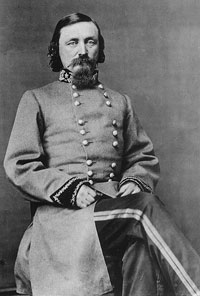
George Edward Pickett (1825-1875)
George Edward Pickett (January 25, 1825 - July 30, 1875) was a major-general in the army of the Confederate States of America during the American Civil War.
Pickett was born in Richmond, Virginia, in 1825. After graduating at the bottom of his class (59th out of 59) at West Point (1846), he gained distinction distinguished himself fighting against the Indians and during the Mexican War, when he was the first to scale the heights during the Battle of Chapultepec. He was also involved in the Pig War.
He later served on the frontier in Washington Territory, and in 1856 occupied San Juan Island, where he prevented the landing of British troops and received the thanks of Congress for his services. He was serving as an infantry captain when the Civil War began. He resigned his commission in June of 1861 and joined the Confederate army, becoming major-general in 1862.
He initially served along the Rappahannock, but joined the main army on the Peninsula for battles at Williamsburg, Seven Pines, and Gaines' Mill, where he was wounded. He did not return to duty until after Antietam, at which time he was assigned to command a division.
At the Battle of Fredericksburg, his men cut down the famous "Irish Brigade".
After Fredericksburg he accompanied Longstreet on his foraging campaign into southeastern Virginia. Pickett took the opportunity to begin his celebrated courtship of Miss Sallie Ann Corbell, a lovely southern belle little more than half his age, who lived in the region.
He led the disastrous and foolhardy "Pickett's Charge" against Union lines in the Battle of Gettysburg, in the process losing almost his entire division (about 15,000 men). To his dying day, he bitterly mourned this great loss.
When Longstreet went west, Pickett was detached to direct operations against New Bern in North Carolina. Later he distinguished himself in the defense of Drewry's Bluff and rejoined Lee's army in time for Cold Harbor.
He lost the Battle of Five Forks in 1865, which lead to the fall of Petersburg and Richmond. During the siege of Petersburg his force was often used as a mobile reserve, seeing action all along the Confederate line. When Phil Sheridan attacked his position at Five Forks on April 1, 1865, Pickett was taken completely by surprise, not even being present with his command. Deciding that it was too late in the day for any attack to take place he and Confederate cavalry general Fitz Lee had accepted an invitation to a picnic from another cavalryman, Tom Rosser. Neither told any subordinate where they were going. When Sheridan's attack began no one knew where to find them. Pickett rejoined his command as it was being unceremoniously driven from the field. On the strength of this disaster Grant ordered assaults all along the long front, and the Confederate line collapsed utterly, forcing the evacuation of Petersburg and Richmond.
Accompanying the last retreat of the Army of Northern Virginia toward Appomattox, Pickett was relieved from duty by General Lee on the day before the surrender, and sent home to await orders. Pickett, however, surrendered with the army the following day.
Confederate raider John Singleton Mosby wrote of one last encounter with General Lee in Richmond after the war. Pickett asked to accompany Mosby to see Lee, who, according to Mosby, treated him with icy civility, inferring disapproval of his absence from his post at Five Forks. After leaving Lee's presence, Pickett said to Mosby bitterly "That man destroyed my division." Mosby replied, "Well, it made you immortal."
Pickett had difficulty obtaining a pardon after the Civil War due to his execution of a number of North Carolina soldiers who had deserted from the Confederacy to serve as Union troops. He spent several months with his wife and baby in Montreal, Quebec, Canada.
Following the war he was an insurance salesman in Richmond and died in Norfolk July 30, 1875.
Decades after Pickett's death, his widow LaSalle Corbell Pickett become a well-known writer and speaker on "her Soldier," eventually leading to the creation of an idealized Pickett who was the perfect Southern gentleman and soldier. A considerable amount of controversy attends LaSalle Pickett's lionizing of her husband, generally involving the probable forgery of letters from Pickett. As a result, General Pickett has become a figure obscured by "Lost Cause" mythology.